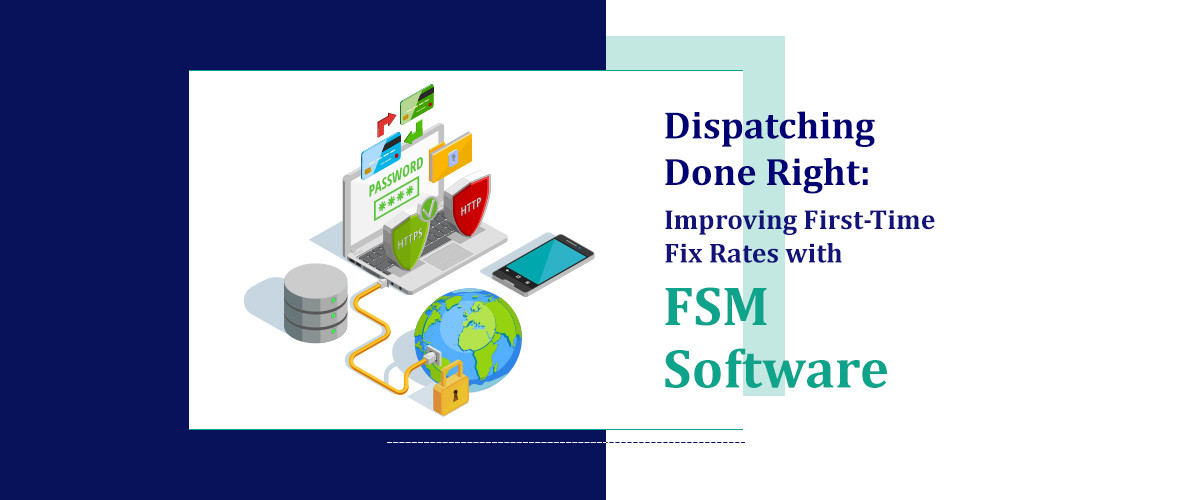What we'll cover
Having a good response time when a customer places an order for field servicing makes a good impression on your customer service. Everyone likes prompt responses – and to make sure your business provides one required efficient field service operations.
A key aspect of improving field servicing experience is to optimize your scheduling and dispatching operations. In this article, we understand the impact of field service management software in making dispatching effective and efficient.
Why do scheduling and dispatching require automation?
Scheduling jobs and dispatching field service technicians is not just about matching work orders to the resources available. Doing it right is what can make or break your customer service efforts – here’s how:
-
Competitive edge: having a good response time makes your customers feel serviced on priority, and thus always choosing your service over other competitors.
-
Optimize resource usage: automation in dispatching helps reduce bench time for field service technicians and deploys equipment for consistent usage and maintenance.
-
Reduce operating expenses: by effectively dispatching resources, you improve revenues, increase your capacity to deliver services to customers, and make sure your resources are utilized adequately.
-
Reduce errors: with automation, you reduce human errors in dispatching operations. Sending the wrong field service worker results in reducing your first-time fix rates, leading to more rounds of servicing and reduced customer trust.
-
Handling emergency calls: with dispatching software, it is possible to quickly assign workers via algorithms and ensure a response to the emergency call. This is not possible in human-involved scheduling.
-
Insights from data: using humans for scheduling and dispatching also means losing out on valuable information in making service decisions. Insights include in-demand services, field service technicians with good customer ratings, time taken to reach the job site, and much more.
How does dispatching software work?
Dispatching software is a set of features or specially designed software that helps in making sure you assign the right job to the relevant field service technicians. It uses algorithms to take into account field service teams' proximity to the job site, their skill sets, availability, customer ratings, and more to assign the job.
Here are the tasks that get automated by scheduling and dispatching software:
-
Creation of the job entry
-
Consolidating the information provided by the customer in a work order format
-
Assigning the field service team to the job scheduled
-
It will understand the job details and assign the necessary equipment and materials from the inventory to the assigned worker.
-
Ensure field service technicians’ approval of the job as soon as possible
-
Optimizes routes to reach the job site and shares it in real-time with the assigned field service teams
-
It will communicate the details about the job, assigned field service technician, real-time location, and other information to the customers via notifications.
-
Any changes in the schedule from your company’s side are communicated instantly to the customer without delays or human intervention.
Apart from managing the nitty-gritty of the operation, it also provides insights based on the field service software chosen:
-
Analyze the performance of workers by taking customer feedback, noting down travel time, equipment health, and more.
-
Share data with other software specializing in other workflows across invoicing, payments, customer relationship management, etc.
Why choose a field service management software with scheduling and dispatching features?
It is better to choose a comprehensive field service management software that includes scheduling and dispatching features. This is because you will be able to manage complete field service operations using a single dashboard – providing much more visibility to your work orders and their execution. You avoid using separate software, thus reducing cost and the need to use expensive app integrations.
Dispatching is a critical component of ensuring effective and efficient field service operations. FSM software also includes self-servicing features – which reduce the burden on your field service teams to cater to customer support requests and focus on providing solutions instead. For example, it will allow you to take care of billing via digital payment methods. Thus, you need not purchase a separate software for the same.
Using comprehensive FSM software, you can reduce failure rates and improve service delivery.
FSM software streamlines dispatching by assigning the right technician with the right skills and tools, reducing response times and ensuring a higher likelihood of fixing issues on the first visit.
Real-time tracking enables precise location monitoring of field technicians, facilitating optimized dispatching. It ensures efficient route planning, minimizing delays and improving overall service delivery.
Yes, many FSM solutions offer integration capabilities with CRM, inventory management, and other business systems, ensuring a cohesive and streamlined workflow for dispatching and beyond.
FSM software provides a centralized communication platform, allowing dispatchers to relay real-time information, updates, and job details to field technicians. This ensures clear instructions and efficient problem resolution.
Optimized dispatching leads to faster response times, timely issue resolution, and improved overall service quality. This positively influences customer satisfaction, loyalty, and brand reputation.




